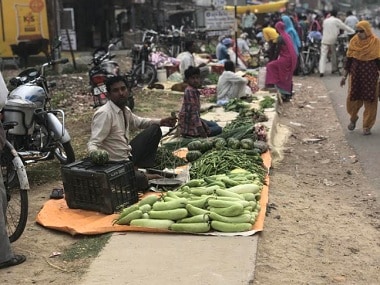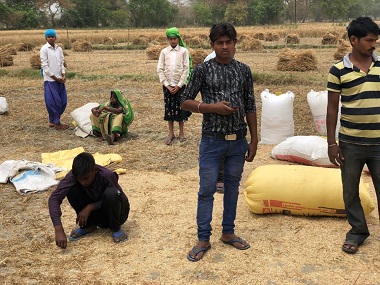Editor’s note: In
this series on contemporary history, consulting editor Ajay Singh takes us to places and talks about people who left yesterday’s indelible mark on today’s politics. In every election, voters of the Raebareli Lok Sabha constituency are reminded of an apocryphal tale that relates to the victory of maverick socialist leader Raj Narain in 1977 over then prime minister Indira Gandhi. Narain, a pugnacious leader from eastern Uttar Pradesh with the physique of a wrestler, was credited with bringing down the Indira regime singlehandedly. He had lost the 1971 elections from Raebareli to Indira. Accusing the prime minister of resorting to unfair means to win the election, he filed a court case and pursued it doggedly. Indira lost the case in the Allahabad High Court and that proved to be a precursor to the imposition of Emergency in 1975. Narain, a die-hard Lohiaite from Varanasi, became a household name across the country for daring to challenge the ‘iron lady’, and bringing her down from the peak of her popularity and power. [caption id=“attachment_6493591” align=“alignleft” width=“380”] Farmers in Raebareli. Firstpost/Ajay Singh[/caption] In a series of moves, Indira subverted the Constitution by not only introducing the constitutional amendments to make the Supreme Court subservient to the Executive but also persuading the then president Fakhruddin Ali Ahmed to sign the declaration of Emergency on 25 June, 1975. In 1977, nearly 21 months later, when Indira Gandhi lifted the Emergency, she once again found herself pitted against feisty Narain whose stature had grown after his incarceration for protesting the Emergency. This time, in one of the most legendary contests, the maverick defeated her. He became Union health minister in the Morarji Desai government. The tale repeated ad nauseam relates to a group of voters approaching Narain to seek his help in resolving some basic issues like power cuts and irrigation. The leader initially tried to explain his limitations as a lawmaker and later ticked them off by saying, “If you people could ditch Indira who did so much for you, how can you be trusted?” This tale is once again in circulation in the constituency represented by Sonia Gandhi. This tale explicitly conveys an unambiguous message that the voters of Raebareli made a mistake in 1977 and suffered heavily for this indiscretion. Indira never returned to this seat, and in 1980 contested from Medak in Andhra Pradesh instead. This Gandhi family borough was initially passed onto a close relative, Sheila Kaul, and subsequently to Satish Sharma. This was the most turbulent phase of the constituency that yearned to regain its lost political prestige. People here were too elated when Sonia, as Congress president, finally adopted this constituency in 2004 and contested the election. Raebareli owes its unique political positioning to the Nehru-Gandhi family. In fact, Indira’s husband, Feroz Gandhi, represented it in 1962. She chose this constituency as political legacy of her husband in 1967. Like Phulpur in neighbouring Allahabad represented by Jawaharlal Nehru, Raebareli was seen as a symbol of the Congress’ invincibility — till the citadel fell in 1977. Rae Bareli district, surrounded by backward districts of Uttar Pradesh, is an exception as Raebareli city is undoubtedly one of the finest of the state. There are many institutes that have come up in the recent past. The area is fast-developing as hub of education and vocational training like the footwear training institute. A university for civil aviation and another institute for petroleum technology have also been set up in the district. During the UPA years, Raebareli also got a major project in the form of the rail coach factory. Top-class schools for primary and secondary education have also come up to cater to the burgeoning ‘rurban’ middle class. Of course, the district can claim to have a surfeit of investment by the state that changed its landscape. A cursory look at the district would convince a visitor that the area is predominantly urban. The existence of the best civic facilities and well-paved roads has given even rural areas a façade of urbanisation. As a result, agriculture in the area has suffered. Although situated along the Ganga with plenty of natural water resources, Raebareli is not giving as much attention to agriculture as the development of institutes and educational institutions. [caption id=“attachment_6493601” align=“alignright” width=“380”]
 Vegetable vendors in Rahi village of Rae Bareli district. Firstpost/Ajay Singh[/caption] This is very evident if one goes to Pratapgarh, an adjoining district, where farmers are taking to varied crops and have internationally earned acclaim for producing aamla in large quantities. In the entire Pratapgarh district, the agro industry has been prospering for over two decades although the region lacked the infrastructure of Raebareli. The reason is obvious. In this district, agriculture is not considered as lucrative as an array of commercial activities bordering on rent-seeking from state power. People of Rarebareli feel indebted to Sonia for making them feel immensely empowered. Its flip side is that it evokes the envy of neighbouring constituencies which are still in the backwaters in terms of all indices. While driving down to from Raebareli to Fursatganj where a large complex of an aviation university is set up, villagers are seen huddled at tea stalls and leisurely discussing politics. In one such tea shop, Tejbhan Singh, a Rajput villager, seems totally committed to the BJP and Prime Minister Narendra Modi. But his views are not shared by many. But another villager, Shankar Yadav, asks him to recall the ‘betrayal’ of Indira. “Don’t forget what Narain said and what the people of Amethi suffered after defeating Indira_ji_," he says emphatically. That people of this constituency are in awe of Sonia is evident from casual conversations with vegetable vendors at Rahi village where they set up shops in large numbers on pavements either side of the state highway. “There is no challenge to Sonia and we are totally committed to her” was the common refrain among those vendors who belong to a variety of social sections in the constituency. Of course, by all reckoning, voters in Raebareli do not seem inclined to repeat any political experiment as they did in 1977. Sonia’s victory from this seat seems a foregone conclusion long before votes are cast.
Vegetable vendors in Rahi village of Rae Bareli district. Firstpost/Ajay Singh[/caption] This is very evident if one goes to Pratapgarh, an adjoining district, where farmers are taking to varied crops and have internationally earned acclaim for producing aamla in large quantities. In the entire Pratapgarh district, the agro industry has been prospering for over two decades although the region lacked the infrastructure of Raebareli. The reason is obvious. In this district, agriculture is not considered as lucrative as an array of commercial activities bordering on rent-seeking from state power. People of Rarebareli feel indebted to Sonia for making them feel immensely empowered. Its flip side is that it evokes the envy of neighbouring constituencies which are still in the backwaters in terms of all indices. While driving down to from Raebareli to Fursatganj where a large complex of an aviation university is set up, villagers are seen huddled at tea stalls and leisurely discussing politics. In one such tea shop, Tejbhan Singh, a Rajput villager, seems totally committed to the BJP and Prime Minister Narendra Modi. But his views are not shared by many. But another villager, Shankar Yadav, asks him to recall the ‘betrayal’ of Indira. “Don’t forget what Narain said and what the people of Amethi suffered after defeating Indira_ji_," he says emphatically. That people of this constituency are in awe of Sonia is evident from casual conversations with vegetable vendors at Rahi village where they set up shops in large numbers on pavements either side of the state highway. “There is no challenge to Sonia and we are totally committed to her” was the common refrain among those vendors who belong to a variety of social sections in the constituency. Of course, by all reckoning, voters in Raebareli do not seem inclined to repeat any political experiment as they did in 1977. Sonia’s victory from this seat seems a foregone conclusion long before votes are cast.
In every election, voters of the Raebareli Lok Sabha constituency are reminded of an apocryphal tale that relates to the victory of maverick socialist leader Raj Narain in 1977 over then prime minister Indira Gandhi
Advertisement
End of Article


)
)
)
)
)
)
)
)
)



